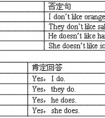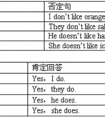选择合适的介词填空。on in inside of for1. We make a big ball ____________snow. 2. They put it ____________ the top. 3. Ihave two sticks ____________his arms-六年级英语
He worked here in 1992.
(3 ) 在------(地方) He works in Dongguan.
(4 ) 在------之内 What are you going to do in 20 years?
(5 ) 在------(早上、下午、晚上)
I do morning exercises in the morning every day.
I usually play basketball in the afternoon.
I often do my homework in the evening.
3. under
在------底下 There is a ball under the bed.
4. near
在------附近 There is a book shop near our school.
5. in front of
在------前面 A boy is standing in front of the house.
6. beside
在------旁边 A football is beside the door.
7. next to
紧挨着 There is a bus station next to No. 13 Middle School.
8. over
在------正上方 A bridge is over the river.
9. on the left
在------左边 The bookstore is on the left.
10. on the right
在------右边 The hospital is on the right.
11. before
在……之前 Mike sits before me.
12. after
在------以后 He went home after school.
13. in the middle
在------中间 The road is in the middle.
14. at
(1) 在------(小地方) I am at school today. I was at home yesterday.
(2) 在------(点钟) I usually go to school at 8:00 am.
(3)看一看 Look at the blackboard.
(4) 在中午 at noon
15. behind
在------后面 There is a broom behind the door.
16.for
(1)给 This present is for you.
(2)为了 Thank you for telling me the way to the zoo.
(3)作为 We have some chips and hamburgers for lunch.
17.to
(1) 到 Take your sport shoes to the P.E class.
(2) 致 Happy birthday to you. Give it to your friend.
18. from
来自 I am from China. = I come from China.
19. from --- to
从------到------ Line up from shorter to taller.
We have class from Monday to Friday.
20. of
------的 He is a student of Kama School.
21. by
(1)在------之前 We must be at home by 6 o’clock.
(2)乘------交通工具 People can go to the moon by spaceship.
I go to school by bus.
22.with
(1) 用 I write a letter with a pen.
(2) 和------一起 He went to Shenzhen with his parents.
23. between
在------与------之间 There is a football match between Class One and Class Three.
24. into
到------里 Sharks can dive into the deep cold water.
25. like
(1)象------ The twins are like their father.
(2)长相------怎样? What’s he like?
26. up
向上 Put up your hands if you have any questions.
27. down
向下 Put down all the books here.
28. about
(1) 大约;关于 It’s about 6:00 now.
(2) ------怎么样? What about---? How about---?
29. what for
为什么 But what for?
早、午、晚要用in,at黎明、午夜、点与分。
年、月、年月、季节、周,阳光、灯、影、衣、冒in。
将来时态in...以后,小处at大处in。
有形with无形by,语言、单位、材料in。
特征、方面与方式,心情成语惯用in。
介词at和to表方向,攻击、位置、恶、善分。
日子、日期、年月日,星期加上早、午、晚,
收音、农场、值日on,关于、基础、靠、著论。
着、罢、出售、偷、公、假,故意、支付、相反,准。
特定时日和"一……就",on后常接动名词。
年、月、日加早、午、晚,of之前on代in。
步行、驴、马、玩笑on,cab,carriage则用in。
at山脚、门口、在当前,速、温、日落、价、核心。
工具、和、同随with,具有、独立、就、原因。
就……来说宾译主,对、有、方状、表细分。
海、陆、空、车、偶、被by,单数、人类know to man。
this、that、tomorrow,yesterday,next、last、one。
接年、月、季、星期、周,介词省略已习惯。
over、under正上下,above、below则不然,
若与数量词连用,混合使用亦无关。
beyond超出、无、不能,against靠着,对与反。
besides,except分内外,among之内along沿。
同类比较except,加for异类记心间。
原状because of,、 owing to、 due to表语形容词
under后接修、建中,of、from物、化分。
before、after表一点, ago、later表一段。
before能接完成时,ago过去极有限。
since以来during间,since时态多变换。
与之相比beside,除了last but one。
复不定for、找、价、原,对、给、段、去、为、作、赞。
快到、对、向towards,工、学、军、城、北、上、南。
but for否定用虚拟,复合介词待后言。
ing型由于鉴,除了除外与包合。
之后、关于、在......方面,有关介词须记全。
in内to外表位置,山、水、国界to在前。
考点名称:副词
- 副词:
用来修饰动词、形容词、其他副词或全句的词,表示时间、地点、程度、方式等。 - 分 类:
1) 时间和频度副词:
now,then,often,always,usually,early,today, lately, next,last,already,generally,frequently, seldom,ever,never,yet,soon,too, immediately, hardly,finally,shortly, before, ago,sometimes, yesterday.
2) 地点副词:
here, there, everywhere, anywhere, in, out, inside, outside, above, below, down, back, forward, home, upstairs, downstairs, across, along, round , around, near, off, past, up, away, on.
3) 方式副词:
carefully, properly, anxiously, suddenly, normally, fast, well, calmly, politely, proudly, softly, warmly
4) 程度副词:
much,little, very,rather,so,too,still, quite, perfectly, enough, extremely, entirely,almost, slightly.
5) 疑问副词:
how, when, where, why.
6) 关系副词:
when, where, why.
7) 连接副词:
how, when, where, why, whether. 副词的位置:
A、副词修饰动词(包括动名词和分词)时,通常位于被修饰动词的后面。
例:Shestudieshard.她学习努力。
B、副词修饰形容词是,通常放在该形容词的前面。
例:LiMingistooyoung.Hecan’tcarrytheheavybox. 李明太小,他搬不动这个重箱子。
C、副词修饰其他副词时,通常放在被修饰副词的前面。
例:Thegirlsingsverywell.这个女孩歌唱得非常好。副词用法:
副词在句中可作状语,表语,补语。
He works hard.
他工作努力。
You speak English quite well.
你英语讲的很好。
Is she in ?
她在家吗?
Let's be out.
让我们出去吧。
Food here is hard to get.
这儿很难弄到食物。
- 最新内容
- 相关内容
- 网友推荐
- 图文推荐
上一篇:Look ____________the big tree. [ ]A. onB. inC. atD. out-六年级英语
下一篇:Children like to play _____________ the snow.[ ]A. on B. toC. at D. in-六年级英语
零零教育社区:论坛热帖子
| [家长教育] 孩子为什么会和父母感情疏离? (2019-07-14) |
| [教师分享] 给远方姐姐的一封信 (2018-11-07) |
| [教师分享] 伸缩门 (2018-11-07) |
| [教师分享] 回家乡 (2018-11-07) |
| [教师分享] 是风味也是人间 (2018-11-07) |
| [教师分享] 一句格言的启示 (2018-11-07) |
| [教师分享] 无规矩不成方圆 (2018-11-07) |
| [教师分享] 第十届全国教育名家论坛有感(二) (2018-11-07) |
| [教师分享] 贪玩的小狗 (2018-11-07) |
| [教师分享] 未命名文章 (2018-11-07) |


![Where is my bag? It's _____________the desk. [ ]A. inB. behindC. on-五年级英语](http://www.00-edu.com/d/file/ks/4/1/44/2019-08-20/small3591750882d019139d20d416cb80f64f1566236486.jpg)
![Where's my pen? [ ]A. It's in the desk.B. It's under the desk.C. It's on the desk.-四年级英语](http://www.00-edu.com/d/file/ks/4/1/44/2019-08-20/small4157828d9d6bc1a02bdbdd4d3ffccde61566236790.jpg)

![I can call you _____________ the phone.[ ]A. inB. atC. onD. of-六年级英语](http://www.00-edu.com/d/file/ks/4/1/44/2019-08-20/small17adfe158040ebb20380cac1c81e7ec81566232881.jpg)
